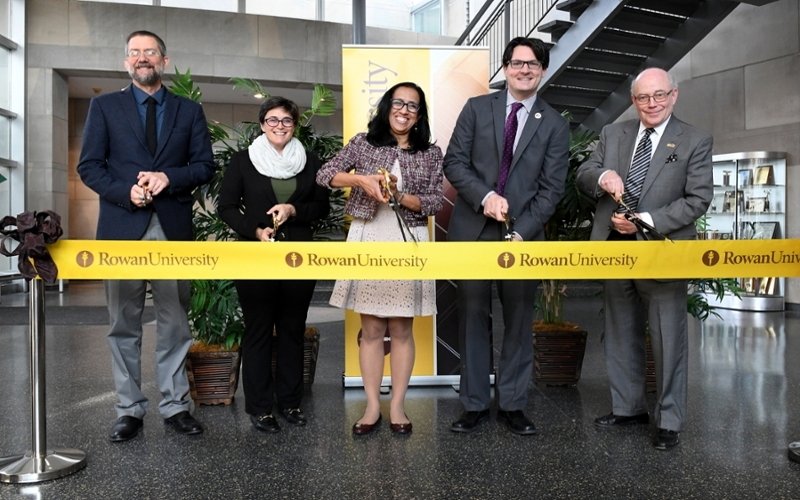Rowan engineers, military partners team up to cut ribbon on Sustainable Facilities Laboratory
Rowan engineers, military partners team up to cut ribbon on Sustainable Facilities Laboratory

As more than 100 future engineers looked on, representatives from the Henry M. Rowan College of Engineering on Tuesday, Nov. 19, teamed up with members of the state Department of Military and Veterans Affairs (NJDMVA) and the New Jersey Army National Guard (NJARNG) to officially cut the ribbon on a new Sustainable Facilities Laboratory at Rowan University.
Located in Rowan Hall, the lab provides a new home for the College’s Sustainable Facilities Center (SFC) as well as critical infrastructure and resources necessary to assist public and private entities to sustainably manage facilities by reducing the environmental, economic and social impacts of buildings.
Since 2008, engineering faculty in the SFC have collaborated with the NJDMVA and the NJARNG on projects related to the sustainable management of 1.95 million square feet of facility space.
NJDMVA and NJARNG have committed $6.8 million to the SFC for the work, which includes everything from energy outreach and planning to building modeling and optimization. The work helps the NJDMVA and the NJARNG operate their facilities as efficiently as possible, reducing costs, saving energy and water and reducing pollution.
More than 150 Rowan graduate and undergraduate students have been involved with the project, supporting the missions of the NJDMVA and NJARNG while also gaining real-world training, according to Civil Engineering Professor Everett, SFC director.
The new lab is equipped with technology needed to conduct building energy and water audits, create and display building information models, produce solar and wind assessments, sustainably manage facilities, and work on energy outreach and planning.
The ribbon-cutting ceremony included Everett; Rowan Vice President for Research Beena Sukumaran, former department head in Civil and Environmental Engineering; Major Jeanne M. Falchek, planning and programming branch chief for the Construction and Facilities Management Office for the NJARNG; Sean Fischer, associate dean for external affairs for the college; and Steven Weinstein, executive vice president for policy and external relationships.
After the ceremony, guests were invited to tour the second-floor lab, where undergraduate and graduate students were hard at work.
Falchek noted that the collaboration with Rowan has been tremendous for students—and a tremendous cost saving for the military.
“The partnership between the NJARNG and Rowan University exists to support and improve the conditions of our facilities on a daily basis,” said Falchek, noting that NJARNG’s 70 facilities include 28 armories. “Most of the buildings are 60 to 70 years old and designed for full-time usage.
“As the NJARNG mission changes, so do our needs for high-tech facilities to train our soldiers.”
According to Falchek, the SPC’s energy audits, which include energy modeling with software, cost less than 14 cents per square foot. The typical industry cost is 25 cents per square foot.
Additionally, Falchek noted, technical studies, documents and formal reports can cost between $100,000 and $150,000 from a private contractor. Under the agreement with Rowan, those items delivered by the SFC are included in the funding.
The partnership between Rowan, the NJDMVA and the NJARNG has gained significant recognition, Sukumaran said. The program has twice received the Army-Community Partnership Award, including this year. Falchek noted that National Guard leaders in other states are seeking partner colleges in their own states to establish similar sustainability collaborations.
“That’s a tribute to Dr. Everett and the students,” Falchek said.
After the ribbon-cutting ceremony, graduate student Nick Nocco of Manahawkin got to work in the lab, where he leads undergraduates in energy audits for the ARNG.
“Students enjoy the work. They enjoy making a difference,” said Nocco, who added that assessing ways to reduce energy usage, including identifying cracks or holes in windows and doors at ARNG facilities, is essential.
“Making even small improvements adds up,” Nocco said.